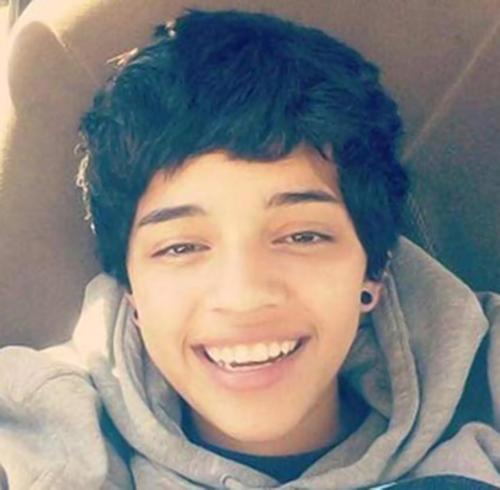#jessie hernandez
16-year-old queer Latina Jessie Hernandez killed by Denver police
January 29, 2015
Jessie Hernandez’ friends describe her as goofy, lovable, with an infectious smile. On Monday morning, the Denver police officers saw in Jessie — a Latina, queer-presenting young person — a threat. For this reason, Jessie is now dead. Just another person extrajudicially killed by a police officer.
On Monday morning just after 7am, police officers from the Denver Police Department arrived in an alley where Jessie Hernandez and a few friends were parked on a call of suspicious activity. When the officers determined the vehicle had been reported stolen, the officers approached the vehicle. Police said that when they approached, the driver hit one of the officers with the car. Both officers fired several shots, struck, and killed Jessie. It is the third time in seven months that the Denver Police Department has claimed that suspects shot by officers have used cars as weapons. When a young woman who pulled out her phone to film the aftermath, she said an officer yelled at her: “Don’t you dare!”
Denver Police Chief Robert White said he believed the shooting was justified. He is not alone — a cursory look at the discussion of the murder on Twitter yields many victim-blaming and demonizing sentiments from people who apparently believe that it is appropriate for a police officer to act as judge, jury, and executioner. At least one media piece calling Jessie a pot-smoking, underage-drinking lesbian has already popped up. New person, same old victim-blaming story. Rinse, repeat.
Run-ins with abusive policing are not unusual for LGBTQ youth of color, and in fact, criminalization plays a huge role in the lives of LGBTQ people of color. LGBTQ people of color experience policing in many of the same ways other people of color do: we are stopped and frisked, we are racially profiled, we are victims of laws that bring together our nation’s draconian and increasingly criminalizing immigration laws with discriminatory policing, like Arizona’s SB1070.
But LGBTQ people of color also experience discriminatory policing that is very particular to the ways officers perceive sexual orientation and/or sexual identity and expression. One of the ways this happens is through the use ofcondoms as evidence: LGBTQ people, especially trans women of color, are profiled as trading sex, and can have condoms confiscated and used as evidence of prostitution-related crimes in jurisdictions across the country. LGBTQ people experience sexual harassment and assault that is very particular to sexual orientation or gender identity and expression, like being asked by police officers for sexual favors. And LGBTQ people, particularly gender non-conforming LGBTQ people of color, are often subject to humiliating strip searches, the purpose of which are to determine a subject’s “real” gender.
LGBTQ people of color, and particularly youth and trans and gender non-conforming people, are often read as “off” or suspicious, and are consistent targets of discriminatory policing.
I’ve written before that women who are targeted by the police, particularly trans and gender non-conforming women, are rarely candidates for “innocence.” They are seen as disposable, far from being moral actors. Jessie Hernandez is already being painted negatively, already being blamed for her own death at the hands of the state. To the police, and surely much of the media that will cover her death, she was a wild, pot-smoking lesbian who used her car as a weapon against the police.
And what if she was? Does that truly justify being killed?
Let’s talk for a moment about what constitutes “justified.” I recall a white man in Aurora, CO — just outside of Denver — getting out unscathed after shooting up a movie theater, killing and injuring dozens. If an armed, dangerous person can be apprehended safely — as surely he should have been — why wasn’t this possible for the unarmed Jessie Hernandez? Why does this seem so impossible for people of color in general? How is it that the bodies of people of color are, on their own, a bigger threat to officers than a white guy with multiple firearms?
White supremacy is how. A system meant by design to exert control over communities can do little else.
Jessie Hernandez did not deserve to die. She did not deserve to have her bleeding, dying, body handcuffed and searched, being flipped lifelessly on the street, before she got any medical attention. Her friends did not deserve the lifetime of trauma this incident will provide them. Even if the car was stolen. Even if Jessie did injure an officer with the car.
“I mean, with everything that’s going on,” a friend said in tears at a vigil, “it wouldn’t be a surprise that she got scared, you know?”
Women’s deaths and abuse at the hands of the police rarely make the news in the same way that the deaths of some men do, but today we speak Jessie Hernandez’s name. Today we remember.
Rest in peace, Jessie.
Post link

